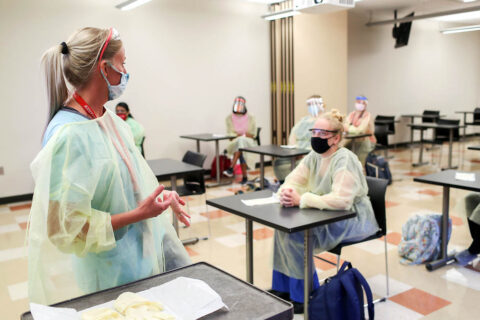 Clarksville, TN – In 2018, after more than 20 years as a nursing professional, Terri Clark joined the Austin Peay State University School of Nursing as a tenure track faculty member. The registered nurse spent most of her career working in hospitals, fitness centers, her own healthcare provider business, and even as a nurse educator at places like Hopkinsville Community College.
Clarksville, TN – In 2018, after more than 20 years as a nursing professional, Terri Clark joined the Austin Peay State University School of Nursing as a tenure track faculty member. The registered nurse spent most of her career working in hospitals, fitness centers, her own healthcare provider business, and even as a nurse educator at places like Hopkinsville Community College.

But once Clark became an assistant professor, she learned she’d need more than this extensive experience to remain on the faculty – she’d need a doctorate.
“The nursing profession lacks faculty, so there’s more leniency (with your education) when you’re hired,” she said. “I was hired with my master’s, and I did research on what type of degrees other schools required.”
She considered earning a Ph.D. or a Doctor of Nursing Practice, but with a full teaching load, she knew it’d be hard to make time to travel to other schools. Instead, Clark decided to stay on campus and help develop a new, ground-breaking nurse educator concentration that is now attached to the APSU Eriksson College of Education’s Doctor of Education in Educational Leadership (Ed.D.) program.
Next May, she’ll become the first graduate of that new concentration.
“I’ve gotten to be really a part of it, having been on the ground floor and helping to develop one of the classes,” she said. “And I have enjoyed it – I’m not going to say it’s easy. I’ve grown so much, I think it will help me be a better teacher.”
Education/Nursing Collaboration
The year Clark joined the APSU School of Nursing faculty, the College of Education launched Austin Peay State University’s first doctoral program. That degree began with only a focus on K-12 leadership, but four years later it has expanded to include two additional concentrations – higher education administration and nurse educator. And, beginning this fall, the Ed.D. program will be offered fully online.
“We have students who live a couple hours away, and since we serve rural districts, it makes it more accessible,” Dr. Sherri Prosser, coordinator of the doctoral program, said. “The dean arranged to offer HyFlex classes. He’s going to outfit one of the bigger lecture rooms with that technology, so students can still attend a few classes face to face, but they also have the option to Zoom those classes. The rest of the classes are online – asynchronous, but still interactive.”
Once the College of Education began offering the degree, the APSU School of Nursing expressed interest in adding a concentration.
“One thing we know in nursing is there’s an overall nursing shortage, and that has contributed to a nursing faculty shortage,” Dr. Michelle Robertson, APSU nursing graduate program coordinator, said. “I was looking at what they were doing, and they had the opportunity for students to take electives, so I contacted Dr. Prosser and asked her if we could collaborate and maybe a nursing-specific student could take their electives in our program.”
The new concentration now provides nurses with educational leadership strategies they’ll need if they want to advance their careers in higher education or in leadership roles at healthcare facilities.
“The program teaches them about curriculum and pedagogy in the nursing electives,” Prosser said. “One elective, they learn about the pedagogy of nursing. When you’re in these non-education fields, you’re a content expert but you may not know how to teach that content. That’s what our program does.”
Improving Community Health
In addition to addressing a nursing and nursing educator shortage, the program has the potential to improve health outcomes in the community. That’s because nurse educator students are also required to address a problem in their field through a scholarly dissertation.
Clark, the inaugural student in this program, will spend her last year researching how to promote a bachelor’s degree in nursing within the profession. To become a registered nurse, an individual can earn either an associate degree or a bachelor’s degree.
“Lots of research shows that with a bachelor’s-prepared nurse, patients have better outcomes and less mortality,” she said. “I’m going to interview employers of nurses and see if they support them earning a bachelor’s degree and what are they doing to encourage that. One study even said a bachelor’s degree led to better outcomes for patients than a nurse’s years of experience.”
For information on the nurse educator concentration, visit www.apsu.edu/programs/graduate/doctor-education-nurse-educator.
For information on the Ed.D. program, visit www.apsu.edu/education/programs-of-study/edd.


